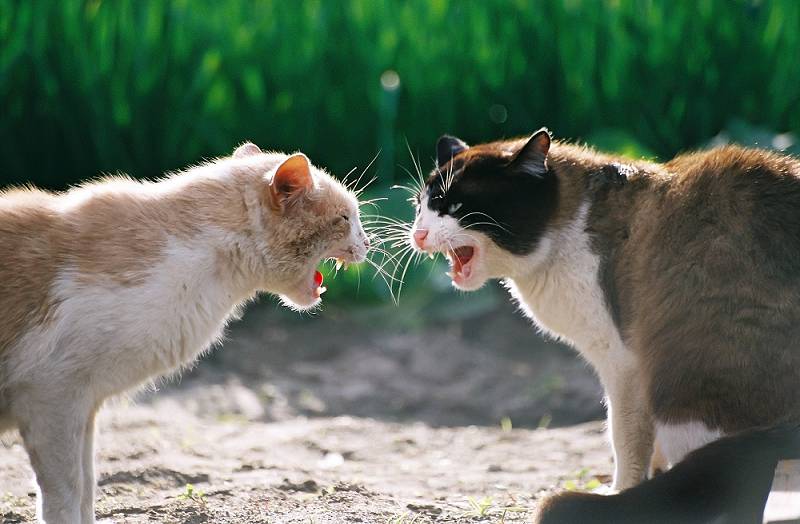
Despite popular opinion, cats would rather do anything than get into a fight. This is because they know that 90% of bites that are suffered during even a generally non-physical confrontation end up as abscesses. The front ‘canine’ teeth in cats inject saliva and bacteria deep under the skin where it festers and will quickly manifest itself in a painful and ugly infection.
The cause of the fights that lead to cat bite abscesses is basically a misunderstanding of territorial limits between two cats. More common behaviour would be to either avoid each other after visual contact, or to leave a pee-mail – peeing on things to advertise the time a cat is in the area so hopefully it does not meet another cat. Cats are very good at timesharing to avoid conflict. Shift work comes naturally to them, and most cats will happily tolerate others in their territory providing they’re not competing for the same patch at the same time.
However, if they do meet, then much noise or a ‘mexican stand off’ is used to again avoid actual contact. The mewling heard during the stand off is distressing to human ears, but is a perfectly natural way for cats to have the conversation necessary to avoid physical contact.
 When that fails to to resolve the problem of who deserves to be there at the time (there is no dominance among cats, and there isn’t among dogs either as it happens), then someone will get bitten. Cats have no mercy, so as one turns to run, the other will change into hunting mode and bite the retreating cat. Where a cat gets bitten can actually tell you how far from its core territory it was attacked.
When that fails to to resolve the problem of who deserves to be there at the time (there is no dominance among cats, and there isn’t among dogs either as it happens), then someone will get bitten. Cats have no mercy, so as one turns to run, the other will change into hunting mode and bite the retreating cat. Where a cat gets bitten can actually tell you how far from its core territory it was attacked.
Nearly all cat bites need treatment – sometimes just pulling the plug of hair out is enough to prevent the abscess developing (half of the infection is because the infected hair is driven under the skin by the bite). However, depending on the position and drainage of the bite/abscess, many need seeing by the vet, as blood poisoning will inevitably develop if the wound closes over and traps the bacteria beneath.
Cats are already susceptible to kidney issues as they get older, without the kidneys themselves having to work harder to overcome the blood poisoning caused by infected bites and abscesses. This makes prompt and effective treatment a direct contributor to the long term health and welfare of the cat, and should not be underestimated. Reducing the blood poisoning helps the kidneys by reducing the need to filter the bacteria out, and helps to prevent increased deterioration over the long term.
PREVENTING the next cat bite abscess is the greatest benefit. Most cats will have a fight – with or without an abscess – in the first 3 months after they move house with their owners (if they go outside) while territories get adjusted. Some cats are regularly attacked, and some are regular attackers.
So, a bacteria-laden sharp ‘canine’ tooth does the damage but the conflict is, in general, the result of two cats being in the wrong place at the wrong time and misreading messages. Rather like car accidents – they rarely happen if everyone is paying attention.
